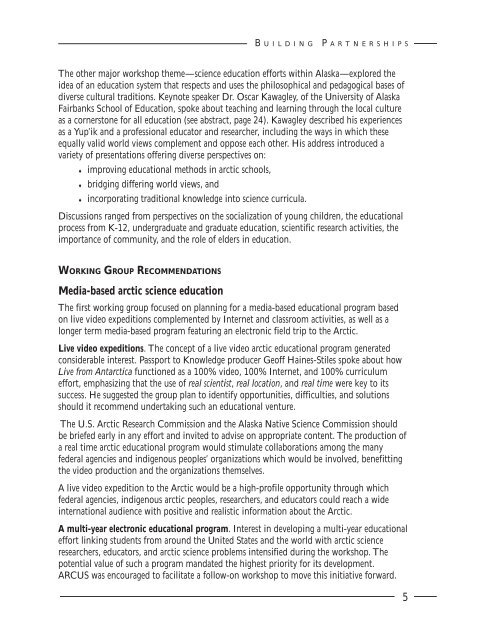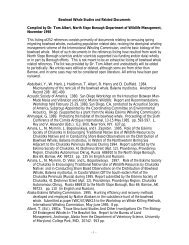ed report 4 page cover - Arctic Research Consortium of the United ...
ed report 4 page cover - Arctic Research Consortium of the United ...
ed report 4 page cover - Arctic Research Consortium of the United ...
Create successful ePaper yourself
Turn your PDF publications into a flip-book with our unique Google optimized e-Paper software.
B U I L D I N G P A R T N E R S H I P S<br />
The o<strong>the</strong>r major workshop <strong>the</strong>me—science <strong>ed</strong>ucation efforts within Alaska—explor<strong>ed</strong> <strong>the</strong><br />
idea <strong>of</strong> an <strong>ed</strong>ucation system that respects and uses <strong>the</strong> philosophical and p<strong>ed</strong>agogical bases <strong>of</strong><br />
diverse cultural traditions. Keynote speaker Dr. Oscar Kawagley, <strong>of</strong> <strong>the</strong> University <strong>of</strong> Alaska<br />
Fairbanks School <strong>of</strong> Education, spoke about teaching and learning through <strong>the</strong> local culture<br />
as a cornerstone for all <strong>ed</strong>ucation (see abstract, <strong>page</strong> 24). Kawagley describ<strong>ed</strong> his experiences<br />
as a Yup’ik and a pr<strong>of</strong>essional <strong>ed</strong>ucator and researcher, including <strong>the</strong> ways in which <strong>the</strong>se<br />
equally valid world views complement and oppose each o<strong>the</strong>r. His address introduc<strong>ed</strong> a<br />
variety <strong>of</strong> presentations <strong>of</strong>fering diverse perspectives on:<br />
♦ improving <strong>ed</strong>ucational methods in arctic schools,<br />
♦ bridging differing world views, and<br />
♦ incorporating traditional knowl<strong>ed</strong>ge into science curricula.<br />
Discussions rang<strong>ed</strong> from perspectives on <strong>the</strong> socialization <strong>of</strong> young children, <strong>the</strong> <strong>ed</strong>ucational<br />
process from K-12, undergraduate and graduate <strong>ed</strong>ucation, scientific research activities, <strong>the</strong><br />
importance <strong>of</strong> community, and <strong>the</strong> role <strong>of</strong> elders in <strong>ed</strong>ucation.<br />
WORKING GROUP RECOMMENDATIONS<br />
M<strong>ed</strong>ia-bas<strong>ed</strong> arctic science <strong>ed</strong>ucation<br />
The first working group focus<strong>ed</strong> on planning for a m<strong>ed</strong>ia-bas<strong>ed</strong> <strong>ed</strong>ucational program bas<strong>ed</strong><br />
on live video exp<strong>ed</strong>itions complement<strong>ed</strong> by Internet and classroom activities, as well as a<br />
longer term m<strong>ed</strong>ia-bas<strong>ed</strong> program featuring an electronic field trip to <strong>the</strong> <strong>Arctic</strong>.<br />
Live video exp<strong>ed</strong>itions. The concept <strong>of</strong> a live video arctic <strong>ed</strong>ucational program generat<strong>ed</strong><br />
considerable interest. Passport to Knowl<strong>ed</strong>ge producer Ge<strong>of</strong>f Haines-Stiles spoke about how<br />
Live from Antarctica function<strong>ed</strong> as a 100% video, 100% Internet, and 100% curriculum<br />
effort, emphasizing that <strong>the</strong> use <strong>of</strong> real scientist, real location, and real time were key to its<br />
success. He suggest<strong>ed</strong> <strong>the</strong> group plan to identify opportunities, difficulties, and solutions<br />
should it recommend undertaking such an <strong>ed</strong>ucational venture.<br />
The U.S. <strong>Arctic</strong> <strong>Research</strong> Commission and <strong>the</strong> Alaska Native Science Commission should<br />
be brief<strong>ed</strong> early in any effort and invit<strong>ed</strong> to advise on appropriate content. The production <strong>of</strong><br />
a real time arctic <strong>ed</strong>ucational program would stimulate collaborations among <strong>the</strong> many<br />
f<strong>ed</strong>eral agencies and indigenous peoples’ organizations which would be involv<strong>ed</strong>, benefitting<br />
<strong>the</strong> video production and <strong>the</strong> organizations <strong>the</strong>mselves.<br />
A live video exp<strong>ed</strong>ition to <strong>the</strong> <strong>Arctic</strong> would be a high-pr<strong>of</strong>ile opportunity through which<br />
f<strong>ed</strong>eral agencies, indigenous arctic peoples, researchers, and <strong>ed</strong>ucators could reach a wide<br />
international audience with positive and realistic information about <strong>the</strong> <strong>Arctic</strong>.<br />
A multi-year electronic <strong>ed</strong>ucational program. Interest in developing a multi-year <strong>ed</strong>ucational<br />
effort linking students from around <strong>the</strong> Unit<strong>ed</strong> States and <strong>the</strong> world with arctic science<br />
researchers, <strong>ed</strong>ucators, and arctic science problems intensifi<strong>ed</strong> during <strong>the</strong> workshop. The<br />
potential value <strong>of</strong> such a program mandat<strong>ed</strong> <strong>the</strong> highest priority for its development.<br />
ARCUS was encourag<strong>ed</strong> to facilitate a follow-on workshop to move this initiative forward.<br />
5




